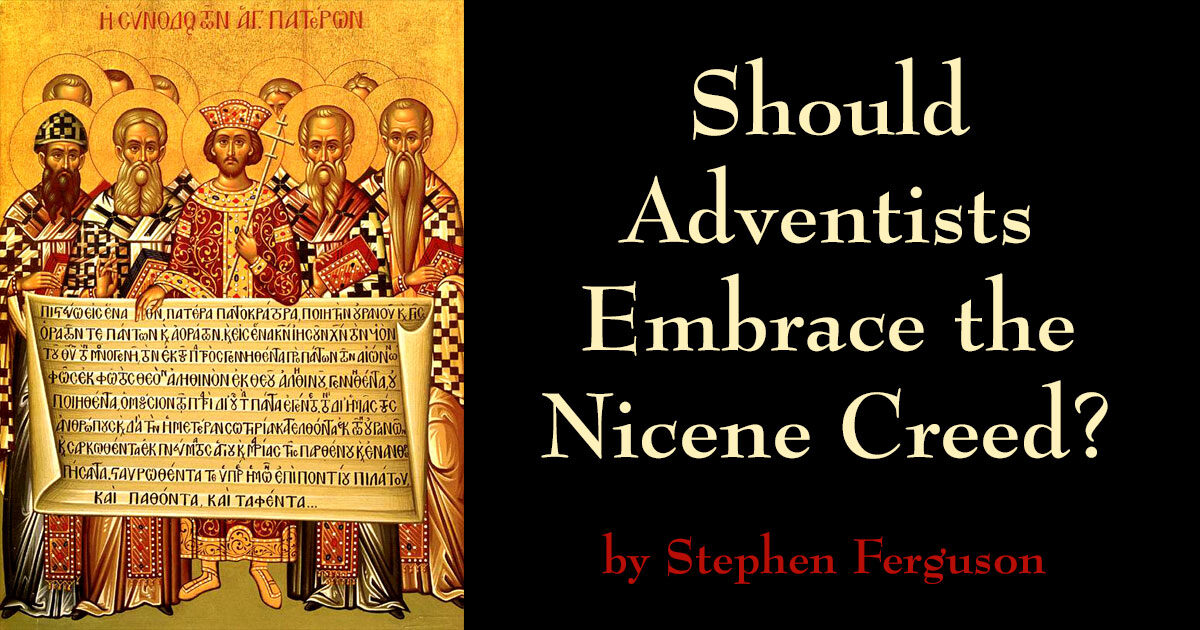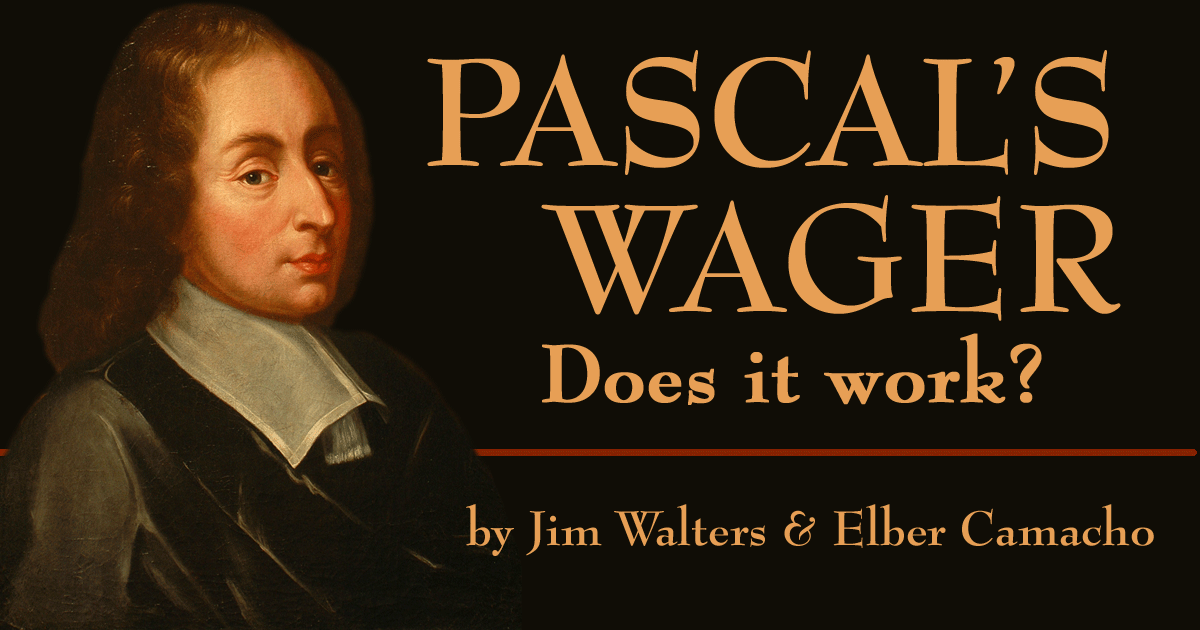Should Adventists Embrace the Nicene Creed?
by Stephen Ferguson | 18 April 2025 |
Recently I was discussing the beliefs of the Seventh-day Adventist Church with some non-Adventist friends. The question arose about whether we Adventists could really claim to be Christians. After all, they asked, don’t Adventists teach Jesus was just a created being called Michael the Archangel?
This is a good example of Adventist theology having been poorly explained.
Our Fundamental Belief #4 says, “God the eternal Son became incarnate in Jesus Christ.” Note the word “eternal”—the Son is not a mere created being. To the extent that we Adventists teach that Jesus was Michael the Archangel, we use it as only another title for the pre-incarnate Christ. An equivalent title is “Angel of the Lord,” which historic Christianity going back to Tertullian, Theodoret, Justin Martyr, and the other so-called Church Fathers also identifies with the Old Testament Christ. Jacob wrestled with an angel (Gen 32:24) but then claimed he had seen God face-to-face. Similarly, the “Angel of the Lord” appeared in the burning bush (Ex 3:2) but is later described as being Godself (Ex. 3:6).
I explained that Adventists have, in fact, entirely mainstream beliefs on the nature of God and Jesus, with Fundamental Belief #2 explicitly affirming the Trinity, “There is one God: Father, Son, and Holy Spirit, a unity of three co-eternal Persons.” We Adventists even have our own equivalent of the filioque clause, which is the widely accepted idea of the Holy Spirit proceeding from both the Father and Son, and not only from the Father. Fundamental Belief #5 makes clear the Holy Spirit was “sent by the Father and the Son to be always with His children.”
My friends were convinced by my arguments. Their next question was, “If you accept the truth of the Trinity and nature of Jesus, why don’t you just affirm the Nicene Creed?”
That’s a great question.
What is the Nicene Creed?
The Nicene Creed was drafted in the year 325 CE at the Council of Nicaea (modern-day Turkey), and was updated in 381 CE. It effectively became Christianity’s first authoritative statement. This creed is to many the litmus test by which one can check to see if another group or person should be considered Christian.
To my Christian friends, it seemed foolish for the Adventist Church to risk being misunderstood by not adopting a document it largely accepted. This conversation made me revisit the Creed to see what it actually said. Here it is in one of the usual English translations:
“We believe in one God, the Father, the Almighty, maker of heaven and earth, of all that is seen and unseen.
“We believe in one Lord, Jesus Christ, the only Son of God, eternally begotten of the Father, God from God, Light from Light, true God from true God begotten, not made, of one Being with the Father; through him all things were made. For us and for our salvation he came down from heaven, was incarnate of the Holy Spirit and the Virgin Mary and became truly human. For our sake he was crucified under Pontius Pilate; he suffered death and was buried. On the third day he rose again in accordance with the Scriptures; he ascended into heaven and is seated at the right hand of the Father. He will come again in glory to judge the living and the dead, and his kingdom will have no end.
“We believe in the Holy Spirit, the Lord, the giver of life, who proceeds from the Father and the Son. With the Father and the Son he is worshiped and glorified. He has spoken through the Prophets.
“We believe in one holy catholic and apostolic Church. We acknowledge one baptism for the forgiveness of sins. We look for the resurrection of the dead, and the life of the world to come. Amen.”
Why I like it
Personally, I like the Nicene Creed. It is in a narrative form, which makes it easy to follow and remember. It seems user friendly—it has even been set to music.
By contrast, our 28 Fundamental Beliefs, while perfectly acceptable in a theological sense, can be confusing and hard to remember—and frankly, they’re more boring. Can you imagine them set to music?
They also seem overly long and complex. As I heard one former General Conference president explain, not only does almost no Adventist believe every single word; almost no one can remember or explain them all!
The 28 Fundamental Beliefs reflect a late-19th- to early-20th-century modernist approach. Ironically, we tried to emulate the scientism of the-then secular world, which had increasingly come to be dominated by scientific (including Darwinian) attempts to put everything into defined categories.
So why didn’t we adopt the Nicene Creed?
- Many of our pioneers weren’t trinitarians
Many of our 19th-century founders rejected the Trinity. Joseph Bates, James White, J.B. Frisbie, J.N. Loughborough, R.F. Cottrell, J.N. Andrews, D.M. Canright, J.H. Waggoner, Uriah Smith, and C.W. Stone all questioned aspects of the doctrine. It is well-documented that many of these founders held Arian or semi-Arian views, which considered Jesus a sort of created, or perhaps only semi-divine, being.
Ellen White, arguably our church’s most famous founding member, held more orthodox beliefs about the Godhead. As a young woman in the fledgling movement she was cautious about pushing her views, at least initially. In time—mostly because she outlived virtually every other founder—she would publicly affirm a mainline Christian view, in virtual alignment with the doctrine of the Trinity as set out in the Nicene Creed:
“There are three living persons of the heavenly trio; in the name of these three great powers—the Father, the Son, and the Holy Spirit.” (Evangelism, p. 615)
“Christ is the pre-existent, self-existent Son of God. . . . In speaking of his pre-existence, Christ carries the mind back through dateless ages. He assures us that there never was a time when He was not in close fellowship with the eternal God.” (Evangelism, p. 616)
“He [Jesus] was equal with God, infinite and omnipotent. . . . He is the eternal, self-existent Son.” (Manuscript 101, 1897)
“The Holy Spirit has a personality…. He must also be a divine person.” (Manuscript 20, 1906)
The Adventist Church didn’t officially affirm the Trinity publicly until 1931. While one can see how christological statements about God and Jesus as set out in the Nicene Creed would have been divisive for early Adventists, these objections don’t seem applicable now, 150 years later.
- Adventists don’t like creeds
Historically, Adventists didn’t like the very concept of creeds – any type of creed. As a reminder, the dictionary definition of a creed is “a brief authoritative formula of religious belief” or “a set of fundamental beliefs.”
Some of you are probably thinking, “Aren’t our 28 Fundamental Beliefs precisely that?” Of course. There is a hairsplitting argument going back to Uriah Smith that statements of fundamental beliefs “are more like a confession of faith than a creed.”
So why couldn’t the church endorse the contents of the Nicene Creed as a confession—just not with the status of a creed?
- The Nicene Creed is a Catholic document containing Catholic teachings
Many of us believe the Nicene Creed is a document of the Roman Catholic Church. In fact, the creed is if anything more Eastern Orthodox in nature: it was written in Greek, in a Greek city, in territory outside the jurisdiction of the papacy. The Latin-based Roman Catholic Church did send legate ambassadors to the councils, and did ultimately endorse the document, but its role in the Nicene Creed’s composition was minor.
I also understand how Adventists could mistake some wording in the Nicene Creed. The document says, “We believe in one holy catholic and apostolic Church.” The word “catholic” here does not mean Roman Catholic. When used in its original context the word catholic simply means “universal” or “whole.” The creed is adopted by a range of other denominations who are not fans of the Vatican.
Our own Fundamental Beliefs seem to replicate the creed when they say in #13, “The universal church is composed of all who truly believe in Christ.” #14 likewise says, “The church is one body with many members, called from every nation, kindred, tongue, and people.”
In other words, the Adventist Church claims to be catholic!
So should the Adventist Fundamental Beliefs refer to the Nicene Creed?
It seems counterproductive to our mission to confuse or mislead others as to our foundational Christian beliefs. Endorsing an ancient formula such as the Nicene Creed when we clearly agree with it—and in effect cut-and-paste its contents—is one way to achieve better clarity. Remember Paul’s advice?
“To the Jews I became like a Jew, to win the Jews. To those under the law I became like one under the law (though I myself am not under the law), so as to win those under the law” (1 Cor. 9:20).
Why do we Adventists so frequently make it harder for ourselves?
 Stephen Ferguson is a lawyer who specializes in planning and development law. Apart from his legal qualifications, Stephen has BA degrees in history and theology, as well as a master’s degree in urban and regional planning. He lives with his wife, Amy, and their two children in Perth, Australia – the world’s most isolated capital city.
Stephen Ferguson is a lawyer who specializes in planning and development law. Apart from his legal qualifications, Stephen has BA degrees in history and theology, as well as a master’s degree in urban and regional planning. He lives with his wife, Amy, and their two children in Perth, Australia – the world’s most isolated capital city.




